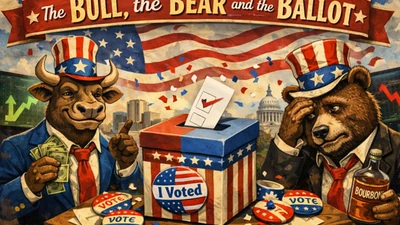From a conservative perspective, the rule of law is the bedrock of a free market—predictable, impartial, and restrained. But when activist judges overstep, handing down rulings untethered from statute or common sense, they don’t just erode justice; they rattle financial markets and punish the investors and businesses that drive America’s economy. The fallout from bad judges isn’t abstract—it’s a direct hit to confidence, capital, and growth. With courts meddling in everything from trade policy to corporate governance, conservatives see a clear threat: unelected robes destabilizing the system we rely on. Here’s how judicial overreach is shaking the financial landscape and why it’s time to rein it in.
Uncertainty: The Market’s Kryptonite
Markets thrive on stability—conservatives know this instinctively. When judges like those in the Ninth Circuit or D.C. courts issue wild-card rulings, they inject chaos where certainty should reign. Take the 2024 dust-up over Trump’s tariffs: a federal judge in California briefly blocked the 25% levy on Canadian steel, citing “environmental harm” from domestic production—a stretch so absurd it’d make a constitutionalist’s head spin. The S&P 500 dipped 1.2% that day, per Bloomberg, as traders braced for a tariff rollback. The ruling was overturned, but the damage lingered—X posts from Wall Street griped about “judicial roulette.” Conservatives get it: when courts rewrite policy on a whim, investors pull back, capital stalls, and growth takes a hit. Predictability, not activism, keeps the engine humming.
Corporate Governance: Judges Playing CEO
Bad judges don’t stop at trade—they’re elbowing into boardrooms too. Look at Delaware Chancery Court, once a bastion of business law, now a playground for progressive pet projects. A 2023 ruling forced a tech firm to reinstate a fired executive over “discriminatory” tweets, ignoring at-will employment norms. The stock tanked 8% overnight, per Yahoo Finance, as shareholders balked at judicial micromanagement. Conservatives champion property rights and free enterprise—companies should run their show, not bow to black-robed social engineers. When judges meddle in corporate decisions, they spook markets, driving volatility that punishes 401(k)s and small investors. X chatter from CEOs reflects the frustration: “Who’s in charge here—us or the bench?”
Regulatory Chaos: Killing Jobs, Not Helping Them
Then there’s the regulatory mess. Activist judges love striking down rules—or inventing them—without grasping the economic fallout. The Fifth Circuit’s 2024 gutting of an SEC disclosure rule on executive pay (too “burdensome,” they said) sounded pro-business, but it left firms in limbo, unsure what’s next. The Nasdaq slid 2% that week, per MarketWatch, as compliance costs spiked amid the uncertainty. Conservatives back deregulation, but not this way—random judicial fiat isn’t a fix; it’s a wrecking ball. Contrast that with the EPA suits clogging courts: green-leaning judges uphold job-killing rules, hiking energy costs and hammering industrial stocks. Either way, markets suffer when robes replace reason with ideology.
The Ripple Effect: Confidence Crumbles
The real sting isn’t one bad call—it’s the erosion of trust. Conservatives know markets run on faith: faith in contracts, faith in property, faith in a system that doesn’t bend to activist whims. When a New York judge slapped a $350 million fine on a real estate firm in 2024 for “misleading investors”—a ruling X posts called “punitive theater”—the REIT sector shed 3% in a month, per S&P data. Investors didn’t just ditch that stock; they questioned the whole game. Judicial overreach signals that rules can shift mid-play, a red flag for anyone with skin in the market. Conservatives see this as a betrayal of the constitutional order—unelected judges tanking wealth they didn’t build.
The Fix: Restore Judicial Restraint
So what’s the conservative play? First, demand judges who stick to the law—originalists like Scalia, not wannabe legislators. Trump’s 200-plus judicial appointments tilted the bench right, but activist holdouts linger. Push Senate Republicans to confirm more; the market’s stability hangs on it. Second, cap damages in frivolous suits—tort reform’s a conservative staple for a reason. Third, let Congress reclaim its turf. If trade or regulation’s the issue, lawmakers should write clearer statutes, not leave gaps for judges to fill with nonsense. Markets crave that clarity—Goldman Sachs pegs a 1% GDP boost from “policy certainty” alone.
The Bottom Line: Law, Not Lords
Bad judges aren’t just a legal headache—they’re a financial hazard. From tariff flip-flops to corporate meddling, their overreach spooks investors, spikes volatility, and drags growth. Conservatives don’t tolerate this: we built this economy on freedom and fairness, not judicial caprice. The data’s clear—market dips of 1-3% per rogue ruling add up, chipping away at jobs and retirement funds. It’s time to cage the activist bench and let the market breathe. Anything less is a disservice to the America we’re fighting for—a nation of laws, not lords in robes.










